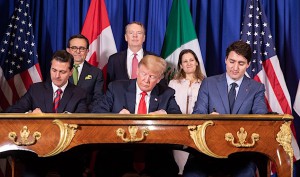
The leaders of Mexico, the United States and Canada sign the “new” NAFTA earlier this year. The new deal is expected to cost automakers $3 billion more in tariffs.
Automakers will pay nearly $3 billion more in tariffs as a result of the higher content rules set forth in the new version of NAFTA, or the U.S.-Mexico-Canada Trade Agreement, as President Donald Trump has dubbed it.
The lofty figure comes from an estimate by the non-partisan Congressional Budget Office developed to determine how much it will cost to implement legislation to meet the rules on the deal, assuming it’s passed by the Senate early next year.
House Democrats just passed a revised version of the agreement last week; however, Senate Majority Mitch McConnell (R-Kentucky) has steadfastly maintained it will not be voted on until January 2020, despite pressure from Trump and other foreign trade officials to move quickly on it.
(U.S. House passes updated USMCA – What does it mean for autos?)

U.S. Trade Representative Robert Lighthizer managed to get a deal with House Dems as well as Mexico and Canada.
USMCA is the replacement for the 26-year-old North American Free Trade Agreement (NAFTA).
For autos to receive tariff-free access between the three countries, the USMCA imposes a 75% regional content requirement, up from 62.5% in NAFTA, along with new mandates to use North American steel and aluminum, Reuters reported.
However, there additional provisions that may prove problematic, such as the mandate that 40% to 45% of vehicle content must come from high-wage areas paying more than $16 an hour. In short, this means the U.S. and Canada. Many vehicles from Mexico will not make the cut, and fail to qualify for U.S. tariff-free access.
(New NAFTA labor provisions with Mexico under siege)
The report’s authors noted their estimates assume that some vehicles and parts would not be eligible for USMCA’s tariff-free access.

Mexican President Andres Manuel Lopez Obrador has been pushing to get the updated USMCA deal done quickly.
“Because of that change in eligibility, CBO projects that duty-free imports of vehicles and parts into the United States from the USMCA partner countries would decline,” the agency said in the report.
While it said a portion of those vehicles and parts would be replaced by U.S. production, some imports of non-USMCA-compliant vehicles and parts would continue, receiving less favorable treatment.
(Automakers Renew Plea for Congress to Pass New NAFTA)
In April, the U.S. International Trade Commission found that USMCA would modestly boost the U.S. economy, especially auto parts production over current conditions, but may curb vehicle assembly and limit consumer choice in cars, Reuters reported.

I wonder if the CBO did a detailed analysis of replacing Chinese and other low wage parts with U.S. and Canadian parts to meet the criteria. When accurately comparing alternatives using Total Cost instead of Ex Works price, cost might rise less than the 2.5% duty on the whole car. See http://www.reshorenow.org/tco-estimator/.